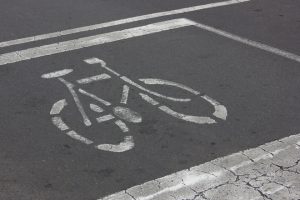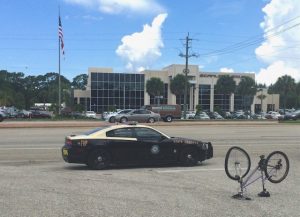Does Florida Law Require Bicycle Helmets? Will it Hurt My Injury Case If I Wasn’t Wearing One?
As a general rule, bicycle helmets are a smart investment in safety for all cyclists, regardless of age or skill – especially in Florida, which has the unfortunate, long-running reputation as the most dangerous state in the U.S. for riding. The Insurance Institute for Highway Safety reported of the thousands treated in hospital emergency rooms nationally for bicycling injuries, traumatic brain injuries account for 60 percent of deaths, 67 percent of hospital admissions and 33 percent of injuries. Only 17 percent of all cyclists killed in crashes were wearing helmets.
If you weren’t wearing a helmet at the time of your bicycle accident, it’s important to understand how Florida helmet law will – or won’t – affect your claims and/ or litigation.
What is Florida’s Bicycle Helmet Law?
 Legally, there is no universal Florida helmet law or even bike helmet law in Florida for that matter. If you’re 16 or older, you don’t have to wear one. However, if you’re younger than that, the law says you must wear one that meets federal safety standards, fastened to your head securely with a strap.
Legally, there is no universal Florida helmet law or even bike helmet law in Florida for that matter. If you’re 16 or older, you don’t have to wear one. However, if you’re younger than that, the law says you must wear one that meets federal safety standards, fastened to your head securely with a strap.
However, a defendant in a Fort Myers bicycle accident cannot use your decision to wear a bike helmet – or to ensure your child is wearing one – as a means to gain the upper hand in the case. The defense strategy, existing in some states that don’t expressly forbid it, involves asserting that a cyclist’s decision to forego the known protection of a helmet, is an act of contributory negligence resulting in exacerbated trauma that otherwise would not have been sustained, and therefore, the defendant shouldn’t be responsible for the full extent of your injuries.
While a rider’s lack of wearing a helmet will likely be mentioned at trial, Florida law expressly prohibits the jury from reducing monies for damages due to your lack of wearing a helmet.
F.S. 316.2065, which details bicycling rights and responsibilities, specifically states,”The failure of a person to wear a bicycle helmet or the failure of a parent or guardian to prevent a child from riding a bicycle without a bicycle helmet may not be considered evidence of negligence or contributory negligence.”
Undercutting assertions of contributory negligence is important. While a partially liable cyclist can still pursue damages against others involved (unlike unfortunate bicycle crash victims in several other states), contributory negligence F.S. 768.81 will proportionately slash the amount of money you can receive. For instance, if your total losses are tallied at $250,000, but a jury apportions you 30 percent fault, you shave 30 percent (or $75,000) right off the top of damages to which you would have otherwise been entitled. The most you could receive at that point would be $175,000. Maybe that doesn’t sound too bad, but factor in medical bills, lost wages and a long, painful recovery, you’re going to need all of the financial help that you can get.
Plaintiffs in any personal injury case want to avoid a finding of contributory negligence, but Florida bike crash victims especially need to tread carefully. Their injuries are likely to be much more serious, thanks to the sheer size disparity between vehicles and the cyclist’s lack of protection from direct bodily impact at high force and awkward angles. You’re going to need the benefit of your entire damage award, so you need a Florida bike crash lawyer prepared to fight for you on it.
Wait – Why Fault? Isn’t Florida a No-Fault State for Auto Insurance?

Florida is indeed a no-fault state for auto insurance. F.S. 627.736 requires all auto insurance policies issued in the state to include personal injury protection (PIP) benefits, up to a maximum of
$10,000 in medical and disability benefits (with several stipulations) and $5,000 in death benefits. Normally, everyone’s own PIP insurance pays for their own injuries, and then if damages
Why is Cycling in Florida So Dangerous?
exceed a certain threshold, you can pursue the bodily injury liability coverage of the other driver (presuming you can prove they were negligent).
Bicycle crashes are special cases because while bikes are considered “vehicles” with regard to their right to share the road, cyclists aren’t required to carry auto insurance to be street legal. So if you’re struck by a car, you can collect PIP from the driver’s insurance. (Same goes for pedestrians.) If you have your own PIP insurance to cover your vehicle (or if you’re covered under a resident relative’s policy), you might access that instead if the other driver lacks insurance. You can still then pursue bodily injury liability insurance from the other driver.
If the other motorist doesn’t have insurance or doesn’t have enough insurance for your injuries, our experienced team will look into whether you have an uninsured/ underinsured motorist (UM/UIM) policy that can kick in and pay or help pay the difference.
Florida has long held the undesirable rank of the worst state for cycling safety in America. The National Highway Traffic Safety Administration (NHTSA) reports in a single recent year, there were:
- 818 bicyclist deaths in the U.S., accounting for 2.3 percent of all traffic deaths (a 12.2 percent year-over-year decrease).
- 45,000 bicycle accident injuries, accounting for 1.8 percent of the total number of injured crash victims. (This figure likely understates the problem because not all injuries are officially recorded.)
- 70 percent of fatal bicycle crashes occurred in urban areas (where riders are more likely to encounter the deadly combination of heavy traffic, limited road space and frequent intersections.)
- 150 bicyclists were killed just in Florida that year, accounting for 5.1 percent of all motor vehicle deaths.
- Factoring in population, Florida’s bicycle crash fatality rate was 7.4. Louisiana came in second at 7.3, but tallied far fewer actual deaths – 34. Third was Vermont, with a rate of 6.4 and a total of 4 deaths. California, which has double Florida’s population, was fourth in terms of raw numbers, with a total of 129 bike crash deaths and a rate of 3.3 per million.
If you’ve been in a crash, F.S. 95.11 allows a statute of limitations of up to four years to take action in a personal injury tort, but it’s best not to wait. Not only is it more expedient to begin investigation and case building immediately, the facts of your case (for example, a crash with an on-the-job city employee) may have tighter deadlines for certain paperwork. Partnering early with a South Florida bicycle accident attorney with decades of experience in Florida helmet law and has expertise with Florida bike law, insurer settlement negotiations and trial skills can be invaluable.
If you are injured in a Florida bicycle accident, contact Fort Myers injury attorneys at Garvin Injury Law at 239-277-0005 for a free initial consultation.
Additional Resources:
Pedestrians and bicyclists, 2016, Insurance Institute for Highway Safety
More Blog Entries:
Will the Florida Legislature finally protect Florida Drivers and their Wallet?, Nov. 14, 2017, Fort Myers Bicycle Accident Attorney Blog





 Florida Personal Injury Lawyer Blog
Florida Personal Injury Lawyer Blog










